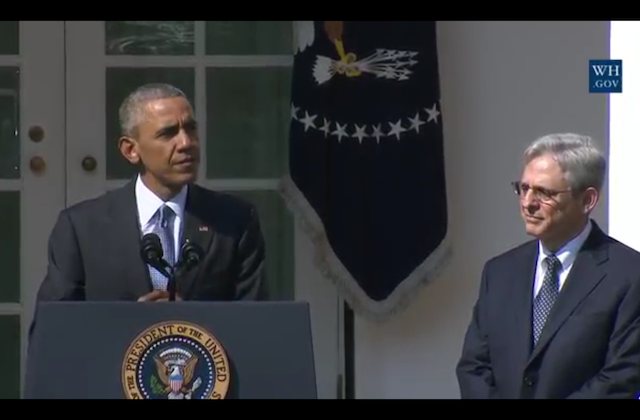Merrick Garland is President Obama's SCOTUS Pick

After a month of speculation following Justice Antonin Scalia’s death, President Barack Obama just announced his nominee for the Supreme Court: Merrick Garland. As he said in a press conference this morning in the White House's rose garden:
I've selected a nominee who is widely recognized not only as one of America's sharpest legal minds, but someone who brings to his work a spirit of decency, modesty, integrity, even-handedness and excellence. These qualities, and his long committment to public servcie, have earned him the respect and admiration of leaders from both sides of the aisle. He will ultimately bring that same character to bear on the Supreme Court, an instituiton in which he is uniquely prepared to serve immediately. Today, I am nominating chief judge Merrick Brian Garland to join the Supreme Court.
Garland, 63, currently serves as chief judge of the United States Court of Appeals District of Columbia Circuit. He is widely viewed as a moderate, which the president spoke to extensively: "He's shown a rare ablity to bring together odd couples, assemble unlikely coalitions, persuade colleauges with wide-ranging judicial philosophies to sign on to his opinions. And this record on the bench speaks, I believe, to judge Garland's fundamental temperament, his instance that all views deserve a respectful hearing."
The president also said that Garland has enjoyed support from Republicans and Democrats alike, and that his name was frequently volleyed when he made his previous two nominations to the court. He spoke to the current political climate, but noted that it should not be a factor here. "It is tempting to make this confirmation process simply an extension of our divided polictics, the squabbling that's going on in the news every day. But to go down that path would be wrong. It would be a betrayal of our best traditions, and a betrayal of our founding documents," he said. "To suggest that someone as qualified and respected as Merrick Garland doesn't even deserve a hearing, let alone an up or down vote to join an institution as important as our Supreme Court—when two-third of Americans believe otherwise—that would be unprecedented."
Garland was one of three finalists who the president considered for the position. The others were Sri Srinivasan and Paul Watford. The annoucement came mere hours after President Obama emailed supporters with a heads up that he would go public with his SCOTUS pick:
Today, I will announce the person whom I believe is eminently qualified to sit on the Supreme Court.
As President, it is both my constitutional duty to nominate a Justice and one of the most important decisions that I—or any president—will make.
I've devoted a considerable amount of time and deliberation to this decision. I've consulted with legal experts and people across the political spectrum, both inside and outside government. And we’ve reached out to every member of the Senate, who each have a responsibility to do their job and take this nomination just as seriously.
He then outlined the criteria he used to make the decision:
First, a Justice should possess an independent mind, unimpeachable credentials, and an unquestionable mastery of law. There is no doubt this person will face complex legal questions, so it is imperative that he or she possess a rigorous intellect that will help provide clear answers.
Second, a Justice should recognize the limits of the judiciary’s role. With a commitment to impartial justice rather than any particular ideology, the next Supreme Court Justice will understand that the job is to interpret the law, not make law.
The third quality I looked for in a judge is a keen understanding that justice is not about abstract legal theory, nor some footnote in a dusty casebook. It’s the kind of life experience earned outside the classroom and the courtroom; experience that suggests he or she views the law not only as an intellectual exercise, but also grasps the way it affects the daily reality of people’s lives in a big, complicated democracy, and in rapidly-changing times. In my view, that’s an essential element for arriving at just decisions and fair outcomes.
Now it’s up to the Senate to either consider the nominee, or risk, as Obama said today, "an abdication of the Senate's Constitutional duty." Follow the new @SCOTUSnom Twitter account to keep up with the process.
